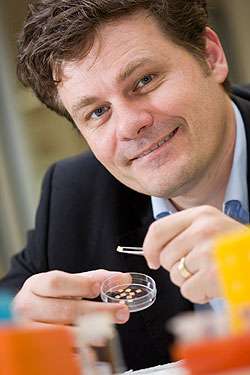One step closer to clinical trials with needle-free vaccines

Researchers at The University of Queensland believe they are a step closer to ridding the world of vaccinations with needles and syringes.
Professor Mark Kendall's team from the Australian Institute for Bioengineering and Nanotechnology (AIBN) has won a major award for their work on the needle-free vaccination delivery device Nanopatch.
As a consequence of winning the 2010 Translational Research Excellence Commercialisation Award, Professor Kendall will meet senior executives from global pharmaceutical company Merck Sharp and Dohme in the US.
The company will also pay up to $10,000 for Professor Kendall to attend the Bio 2011 convention in Washington DC.
Professor Kendall said winning the award was a “great shot in the arm” for his research team, providing both a pat on the back and a chance to move the technology forward.
“This is important, as it is a step towards partnering our Nanopatch with one of the world's leading vaccine companies,” he said.
“Our ambition is for Nanopatch to be taken from the current stage of animal model success through the clinical trials, and on to the market as a next-generation vaccine delivery device, potentially displacing the needle and syringe.
“This progression requires commercialisation and partnership with the right players. This award is an important step along this pathway.”
Nanopatch has been shown in trials to provide a protective immunisation in mice, with less than a hundredth of the dosage used compared to needle and syringe.
A part of the appeal of the Nanopatch is that it is painless, needle-free and is a potential solution for those with needle phobia.
Because the vaccine is formulated in dry form, it is also thermostable, removing the need for refrigeration.
Nanopatch is smaller than a postage stamp and is dissolvable, eliminating the possibility of needle-stick injury.
“When compared to needle and syringe immunisations – with all the associated costs – the Nanopatch is cheap to produce,” Professor Kendall said.
“It is easy to imagine a situation in which a government might provide vaccinations for a pandemic such as swine flu to be collected from a chemist or sent in the mail.”
Professor Kendall said the work had been in progress for five years and his team hoped to start clinical trials soon.















